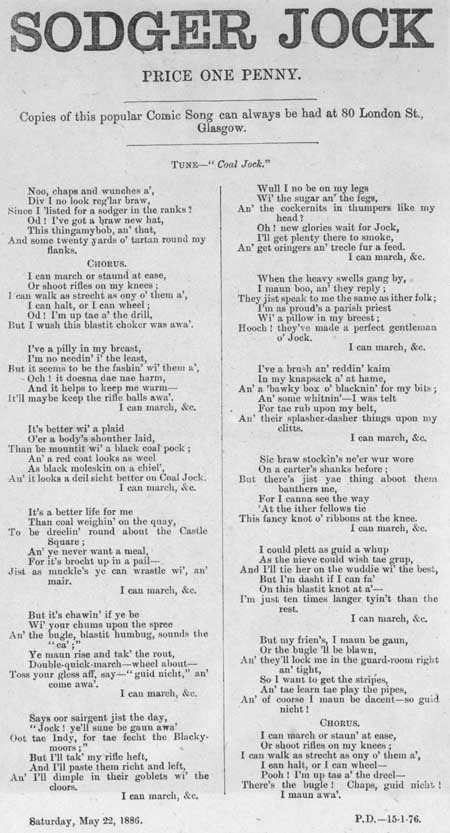Commentary
This ballad begins: 'Noo, chaps and wunches a', / Div I no look reg'lar braw, / Since I 'listed for a sodger in the ranks? / Od! I've got a braw new hat.' The text preceding it reads: 'PRICE ONE PENNY / Copies of this popular Comic Song can always be had at 80 London St., Glasgow. / Tune- "Coal Jock".' This sheet was published on Saturday 22nd May, 1886.' This song draws comparisons between the occupation of soldiering and that of coal mining - the military comes out on top, as the title would suggest. The skills gained, clothes provided and food are all highlighted in favour of the soldier's job. Britain at this time was still an empire and so had armed units deployed in most of her territory. Britain was also involved in two conflicts during this era, one in Sudan and one in Burma which meant more men and resources would have been required.
The Poet?s Box in Glasgow operated from 1849 to 1911. Matthew Leitch was the proprietor at 6 St. Andrew Lane?s, a narrow street on the south side of Gallowgate, from 1850 to 1858. His son William Munsie Leitch worked at the same address from 1859 to 1865 and at varous addresses in London Street until 1911. Many of the broadsides published by the Glasgow Poet?s Box were dated and some carried advertisements, not just for printed items but also for shoe blacking and ?soap for lovers?! Like the other ?boxes? in Dundee and Edinburgh, the Glasgow one sold love songs, sea shanties, parodies and dialogues. It is not clear what the connection between the different Poet?s Boxes were. They almost certainly sold each other?s sheets. It is known that John Sanderson in Edinburgh often wrote to the Leitches in Glasgow for songs and that later his brother Charles obtained copies of songs from the Dundee Poet?s Box. There was also a Poet?s Box in Belfast from 1846 to 1856 at the address of the printer James Moore, and one in Paisley in the early 1850s owned by William Anderson.
Early ballads were dramatic or humorous narrative songs derived from folk culture that predated printing. Originally perpetuated by word of mouth, many ballads survive because they were recorded on broadsides. Musical notation was rarely printed, as tunes were usually established favourites. The term 'ballad' eventually applied more broadly to any kind of topical or popular verse.
View Transcription | Download PDF Facsimile
|
 |
Date of publication:
1886 shelfmark: L.C.Fol.70(107)
 View larger image
View larger image
|


